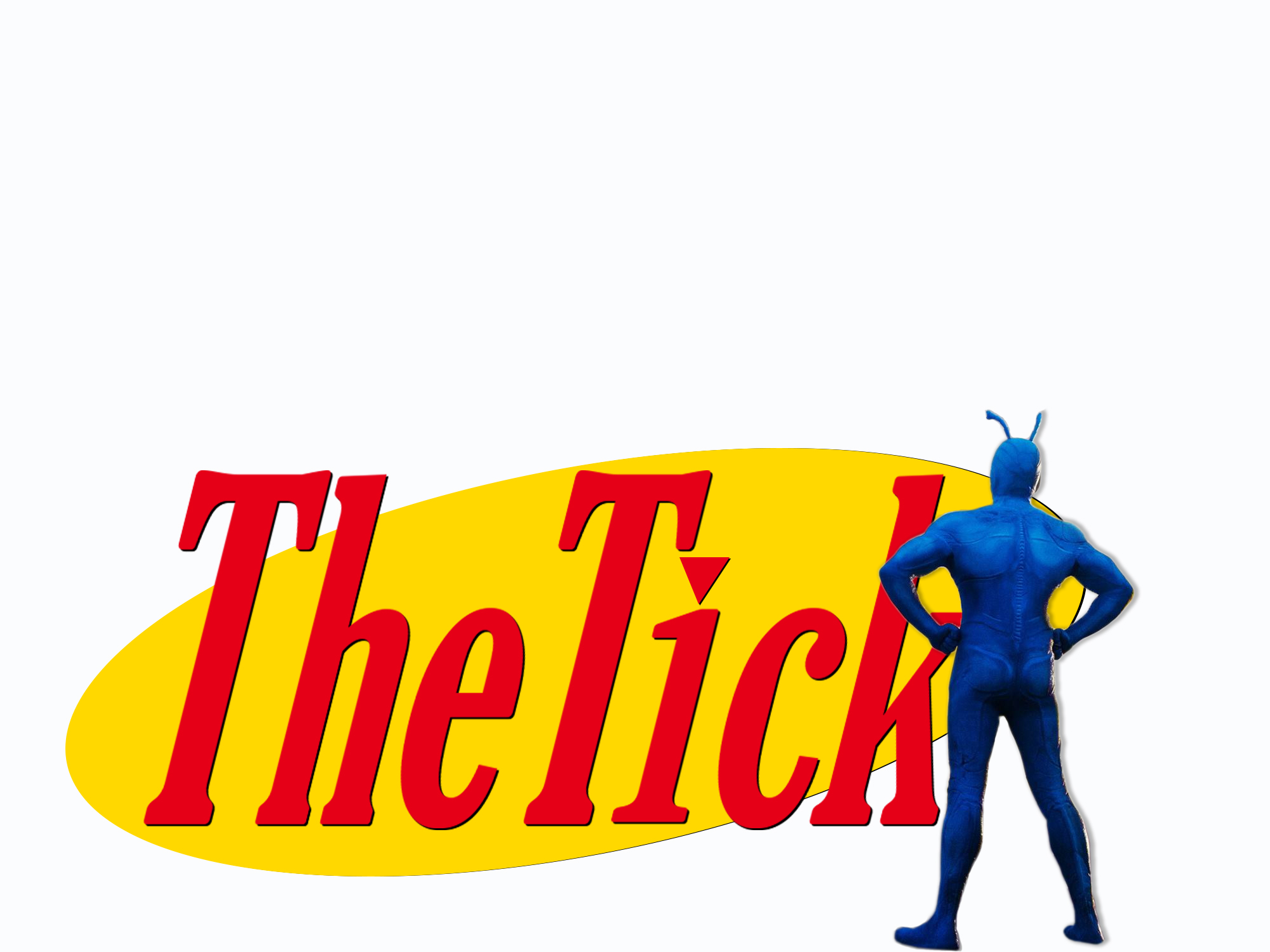The Seinfeld of superhero TV
The Tick was a superhero show about nothing — and it was glorious


A free daily email with the biggest news stories of the day – and the best features from TheWeek.com
You are now subscribed
Your newsletter sign-up was successful
Before the annoying over-saturation of superheroes that's been choking the life out of American culture, there was The Tick (2001). An endearingly gregarious send-up of muscle-bound men and women in capes and tights, the live-action show jettisons extravagant combat in favor of wry innuendos and dialogue laced with all kinds of witty-silly wordplay. It is, 15 years later, the show we desperately need in 2016.
These days, you can't go online without being slapped in the face with ads and blog posts about superheroes. You can't walk into Times Square without seeing superhero billboards blot out the sun. They're ubiquitous, a pandemic rash. This year, we've been bludgeoned with at least five major franchise superhero movies: Captain America: Civil War; Batman v Superman; Suicide Squad; Deadpool; and X-Men: Apocalypse. On the small screen, there's Jessica Jones and its spin-off Luke Cage, as well as Agents of S.H.I.E.L.D., which makes one long for the campy fun of The Man From U.N.C.L.E.
Superhero movies are big, brash, boorish endurance events, which is why The Tick, as well as the 1994 cartoon that preceded it, feel so necessary today. With its dearth of action and abundance of jibber-jabber, The Tick has more in common with Seinfeld than it does Spider-Man. You can almost picture Thomas Pynchon sitting down with a cognac to enjoy the show, which turns the absurdity of superheroes into an absurdist meditation on banality.
The Week
Escape your echo chamber. Get the facts behind the news, plus analysis from multiple perspectives.

Sign up for The Week's Free Newsletters
From our morning news briefing to a weekly Good News Newsletter, get the best of The Week delivered directly to your inbox.
From our morning news briefing to a weekly Good News Newsletter, get the best of The Week delivered directly to your inbox.
In lieu of a somber origin story, the pilot, still the best thing Barry Sonnenfeld has ever directed, starts with the blue antennaed hero (Patrick Warburton) looming atop a bus station, ever vigilant. He has the strength of many men and is nigh invulnerable, but, alas, he is an idiot.
When a schlubby-looking guy in a sales rack suit is thwarted by an insolent coffee-vending machine, the Tick, who exists solely to fight evil, springs into action. He grabs the machine and shakes it violently, lecturing it, "Armless bandit, empty your bladder of that bitter black urine men call coffee! It has a price and that price has been paid!" The machine's bladder gives and coffee cascades into a paper cup. "Java Devil, you are now my bitch."
The Tick has no tragic beginning, no deep-seated agony to rectify or dead parents to avenge or girlfriend in a fridge. He simply annoys the bus stop employees with his inanity, so they buy him a ticket to The City to get rid of him. In our current culture of brooding antiheroes and scruffy-faced men trying to assuage angst with vengeful crusades, the Tick fights evil because it's the only thing he understands. Like the coffee machine, he has one purpose. He's a man-sized fist ready to be thrown at whatever villainy he encounters.
He's aided by his milquetoast sidekick Arthur (David Burke), a mild-mannered accountant who grows tired of his menial life and, despite his lack of powers or abilities, decides to quit his job and become a superhero. The show's coterie of inept heroes also includes Batmanuel (Nestor Carbonell and his ravishing eyelashes) and Captain Liberty (Liz Vassey), both of whom initially detest the Tick for showing them up with his actual powers, but are soon won over by the cut of his gibberish. They mostly dwell in diners, bickering and bantering and sharing stories of former conquests/times they were conquered. If Tony Soprano was right when he said "remember when" is the lowest form of conversation, these are the lowliest superheroes.
A free daily email with the biggest news stories of the day – and the best features from TheWeek.com
Because The Tick is still about a superhero, and because we're enveloped by a culture that's addicted to them, it's getting a reboot this year. Peter Serafinowicz dons the blue cowl, and you don't envy the guy, given what Warburton achieved in the same role. Like Superman holding Michael Shannon's head, trying to decide if he should snap Shannon's neck or let a family die, it's an unfortunate situation that has no reason to exist in the first place. The pilot vies for relevancy, but feels like just another superhero show littered with camp buffoonery. It doesn't have that acerbic self-awareness in its marrow, like the comic and live-action show.
Summer '16 was rife with bloated, bulbous blockbusters and portentous harbingers of doom: Batman v Superman had Doomsday; X-Men: Apocalypse had Apocalypse; Suicide Squad had Jared Leto. The Tick had a confused robot trying to assassinate Jimmy Carter 30 years too late, and, in its de facto finale, the Terror (Armin Shimerman, known as the nefarious stickler Principal Snyder on Buffy), a 112-year-old menace who's spending his final days lying in bed waiting to die... until the Tick accidentally goads him into un-retiring. He's as exhausted with life as we are with overly-solemn superhero movies.
The show, which debuted a year after Bryan Singer's X-Men and one year before Sam Raimi's Spider-Man, was helmed by Ben Edlund, the creator of the original comic book series. Given how fanboys will bleat and carp about the slightest alteration to their beloved superheroes, it's funny that Edlund himself chose to change his creations. Aesthetically and tonally, the short-lived show existed as its own entity, not beholden to any tradition or misguided sense of loyalty. And the changes weren't arbitrary — Edlund and Co. tailored the show to fit a television screen. The most notable example is the Tick's costume, designed by Colleen Atwood, which relinquishes the blank, bug-eyed look of the comic, leaving Warburton's face wholly exposed.
Warburton is the face, voice, and soul of The Tick. The failure of most modern superhero claptrap lies in the casting, which seems more concerned with marquee names adorning headlines than finding the actor who genuinely fits the role. And casting a hero, or a villain, is immensely difficult, and choosing the wrong actor can have devastating consequences. Think of Henry Cavill, a black hole that absorbs all the charisma out of a film, playing Superman. Or Jai Courtney, whose masquerade as an ersatz actor may be the greatest piece of performance art of this decade, as the boomerang guy in Suicide Squad.
But Patrick Warburton as the Tick may be the keenest piece of superhero casting ever. With that cockeyed grin on his unfettered face and the sanguine, baritone voice in which he muses nonsensically, babbling like a brook, Warburton imbues the character with an almost anti-pathos. He's the anti-anti-hero we deserve.
Greg Cwik is a writer and editor. His work appears at Vulture, Playboy, Entertainment Weekly, The Believer, The AV Club, and other good places.
-
 Political cartoons for February 21
Political cartoons for February 21Cartoons Saturday’s political cartoons include consequences, secrets, and more
-
 Crisis in Cuba: a ‘golden opportunity’ for Washington?
Crisis in Cuba: a ‘golden opportunity’ for Washington?Talking Point The Trump administration is applying the pressure, and with Latin America swinging to the right, Havana is becoming more ‘politically isolated’
-
 5 thoroughly redacted cartoons about Pam Bondi protecting predators
5 thoroughly redacted cartoons about Pam Bondi protecting predatorsCartoons Artists take on the real victim, types of protection, and more
-
 Walter Isaacson's 'Elon Musk' can 'scarcely contain its subject'
Walter Isaacson's 'Elon Musk' can 'scarcely contain its subject'The latest biography on the elusive tech mogul is causing a stir among critics
-
 Welcome to the new TheWeek.com!
Welcome to the new TheWeek.com!The Explainer Please allow us to reintroduce ourselves
-
 The Oscars finale was a heartless disaster
The Oscars finale was a heartless disasterThe Explainer A calculated attempt at emotional manipulation goes very wrong
-
 Most awkward awards show ever?
Most awkward awards show ever?The Explainer The best, worst, and most shocking moments from a chaotic Golden Globes
-
 The possible silver lining to the Warner Bros. deal
The possible silver lining to the Warner Bros. dealThe Explainer Could what's terrible for theaters be good for creators?
-
 Jeffrey Wright is the new 'narrator voice'
Jeffrey Wright is the new 'narrator voice'The Explainer Move over, Sam Elliott and Morgan Freeman
-
 This week's literary events are the biggest award shows of 2020
This week's literary events are the biggest award shows of 2020feature So long, Oscar. Hello, Booker.
-
 What She Dies Tomorrow can teach us about our unshakable obsession with mortality
What She Dies Tomorrow can teach us about our unshakable obsession with mortalityThe Explainer This film isn't about the pandemic. But it can help viewers confront their fears about death.
